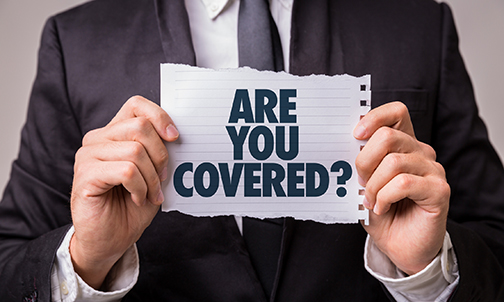Call Don today: 951-533-4966
Blog
Don Welker's Financial Minute

Lawsuits…fires…theft…fraud…injuries…cyberattacks…workers comp claims. Without careful planning, one disaster can destroy your business. To ensure that your business is protected, you must have the right types of insurance in place, with policies that offer adequate coverage levels for your needs.
Earlier this year I wrote about how to shop for insurance for your business. This month I’d like to address what it is that you are shopping for.
Insurance policies that most businesses should consider
Be sure to talk to your insurance broker about:
• Property and General Liability Insurance – A must, this protects your property against physical damage and your company against claims of bodily injury or property damage.
• Workers’ Compensation Insurance – Required in California if you have one or more employees. Be sure to see my previous article on “How to Control Your Workers’ Comp Premiums.”
• Vehicle Insurance – Mandatory if your company owns and operates any motor vehicles.
• Health Insurance – As of this writing, this is mandatory for companies of a certain size.
• Directors and Officers Insurance (D&O) – Protects your corporation’s directors and officers from personal liability in the event of a claim against the business.
• Key Person Life Insurance – Can be important if your business depends on the knowledge or expertise of a particular person.
• Employment Practices Liability Insurance – Provides coverage against employment-related claims, such as discrimination, harassment or wrongful termination.
• Business Interruption Insurance – Covers the loss of income that your business suffers after a disaster.
• Cybersecurity Insurance – Helps address the damage after cyberattacks and data breaches.
• Professional services firms – Errors & Omissions Insurance (also known as Professional Liability Insurance) to protect against negligence claims based on mistakes your company made or your company’s failure to perform.
Industry-specific insurance needs
Examples include:
• Petroleum industry – Environmental coverage in case there’s a spill.
• Construction industry – Policies to fulfill bonding requirements.
• Manufacturing industry – Product liability insurance.
Insurance is not a “set it and forget it” item
Because changes in your business often warrant changes in your insurance coverages, annual reviews with your insurance broker are a must. You’ll want to discuss the impact of:
• Purchases or sales of assets (including vehicles and equipment)
• Changes in sales volumes
• New products or services offered
• Leases ended or entered into
• Changes in key personnelOther significant changes
Need help sorting through all of this and working with the insurance broker to get the right coverages in place? Give me a call! As your part-time CFO, this is one of the many services that I provide.